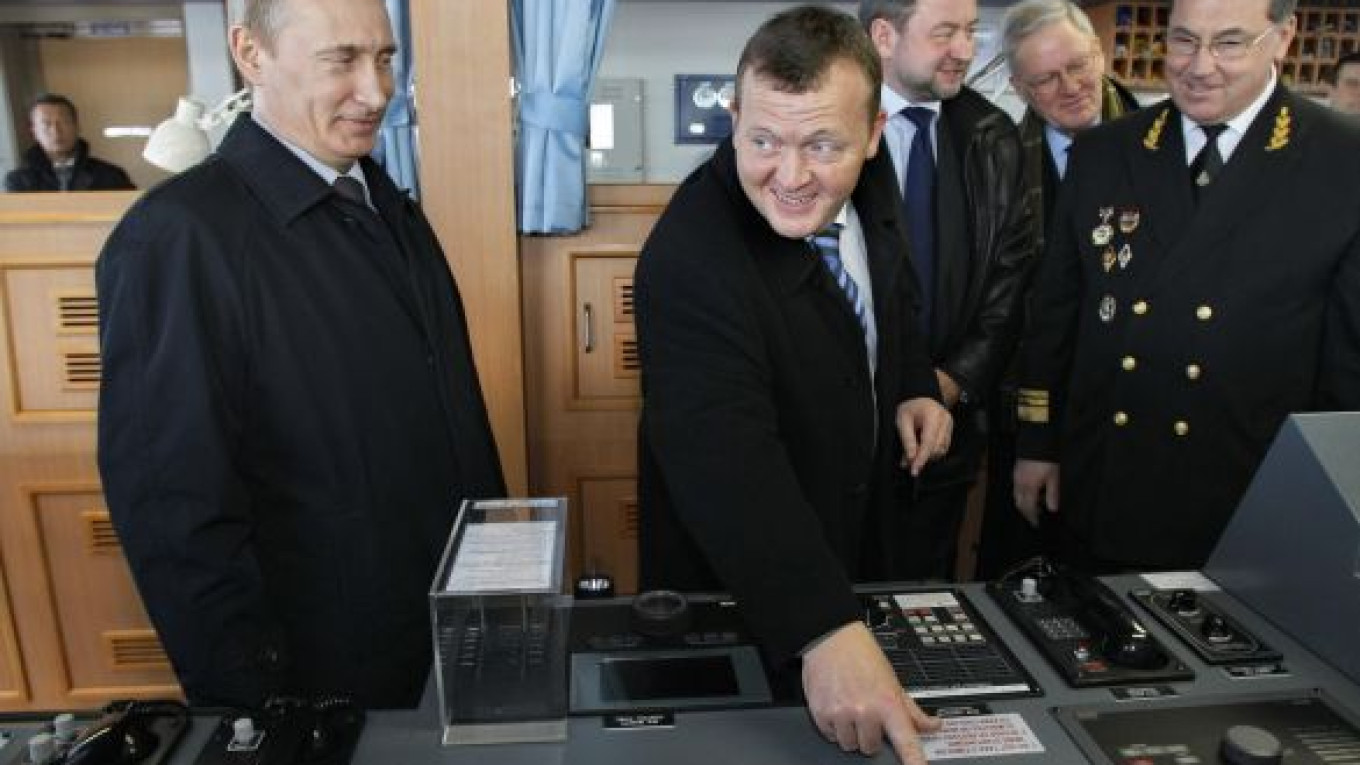In a new sign of a thaw in ties between Moscow and Copenhagen, Prime Minister Vladimir Putin and his Danish counterpart, Lars Lokke Rasmussen, on Monday opened a new shipping line that Denmark's Maersk will use to link Russia with Latin America.
Relations have been chilly because of Denmark's criticism of Russia's handling of the war in Chechnya. Another irritant was Danish support of NATO's eastward expansion.
Denmark moved to heal the rift by striking a deal with Gazprom in 2006 to buy its gas from the Nord Stream pipeline, which is scheduled to begin operating late next year. Contacts intensified after Rasmussen became prime minister in April, and he has met Putin three times in the four months since November.
“I am glad we are meeting for a third time,” Rasmussen said in St. Petersburg. “I think it's a testimony to the improvement of bilateral ties.”
In opening the new shipping route, the prime ministers climbed onboard a Maersk-owned ship, and Rasmussen pushed a button for a siren to mark the line's launch. Putin noted the South Korean-made ship uses the Russian navigation system Glonass.
The direct line — linking St. Petersburg to Guayaquil, Ecuador — will shorten travel time for trade with Latin America to three weeks and cut costs, Putin said.
“For consumers, it means, I hope, a containment of prices for goods, including tropical fruit,” he said.
Russian exporters are counting on the line to open new markets for coal mining equipment for Chile; fertilizers for Ecuador and Columbia; and food for Central America and the Caribbean, the Cabinet said in a statement Sunday.
The ships will make calls at the ports of Bremerhaven, Germany, and Rotterdam, Netherlands.
Maersk, which invested $45 million in the project, will run six ships with a capacity for 2,500 containers measuring 6 meters on the route, the statement said. The company, one of the world's largest shippers, already handles 25 percent of Russia's container traffic to the Asia Pacific and Middle East and 20 percent of containerized cargo in the opposite direction, the Cabinet said.
The warmer ties are a remarkable shift from 2002, when a Russia-European Union event had to be moved from Copenhagen to Brussels amid a diplomatic tug of war between Russia and Denmark.
“Things are getting back to normal,” said Arkady Moshes, director for Russia studies at the Finnish Institute of International Affairs in Helsinki. “What is happening is … Denmark's joining the ranks of Russia's pragmatic European partners.”
President Dmitry Medvedev is expected to visit Denmark next month for a second time, after attending a climate summit there in December.
Despite the political deep freeze, business activities moved ahead in some industries. Danish brewer Carlsberg successfully expanded on the Russian market with the Baltika brand name, while Novolipetsk Steel — owned by Vladimir Lisin, named by Forbes magazine this month as Russia's richest businessman — bought Denmark's DanSteel in 2002.
In an attempt to move forward, Putin on Monday suggested that the countries jointly build commercial ships.
After the line opening, Putin met with Finnish President Tarja Halonen and a group of Finnish businesspeople to tout increased investment in Russia. He said nine Finnish companies were participating in logging and timber processing in the country and invited more to join them.
Putin reiterated that Russia's freeze on timber export duties would last until the end of the year. Russia previously delayed the introduction of prohibitively high export duties at the request of Finland's government.
A Message from The Moscow Times:
Dear readers,
We are facing unprecedented challenges. Russia's Prosecutor General's Office has designated The Moscow Times as an "undesirable" organization, criminalizing our work and putting our staff at risk of prosecution. This follows our earlier unjust labeling as a "foreign agent."
These actions are direct attempts to silence independent journalism in Russia. The authorities claim our work "discredits the decisions of the Russian leadership." We see things differently: we strive to provide accurate, unbiased reporting on Russia.
We, the journalists of The Moscow Times, refuse to be silenced. But to continue our work, we need your help.
Your support, no matter how small, makes a world of difference. If you can, please support us monthly starting from just $2. It's quick to set up, and every contribution makes a significant impact.
By supporting The Moscow Times, you're defending open, independent journalism in the face of repression. Thank you for standing with us.
Remind me later.


